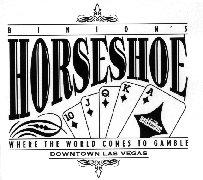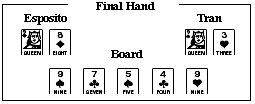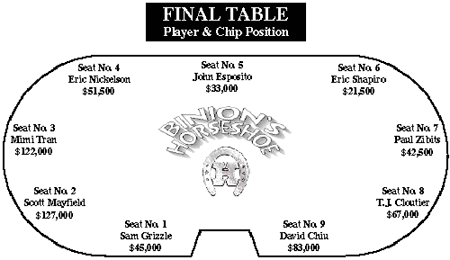

|
Volume 30 • Number 3 • April 29, 1999 |
| previous event |
| next event |
1999 Champion
JOHN ESPOSITO
Event #3 Results
Limit Hold'em
$2,500 Buy-in
| 1. John Esposito | $219,225 |
| Las Vegas, NV | |
| 2. Mimi Tran | 112,575 |
| Milpitas, CA | |
| 3. Scott Mayfield | 56,290 |
| Grants Pass, OR | |
| 4. David Chiu | 35,550 |
| Monterey Park, CA | |
| 5. Sam Grizzle | 26,660 |
| Garden Grove, CA | |
| 6. Eric Nickelson | 20,740 |
| Castro Valley, CA | |
| 7. Paul Zibits | 14,810 |
| Long Beach, CA | |
| 8. Eric Shapiro | 11,850 |
| Boulder, CO | |
| 9. T.J. Cloutier | 9,480 |
| Richardson, TX | |
| 10. Ken Flaton | 7,110 |
| 11. Mike Halford | 7,110 |
| 12. Mike Markas | 7,110 |
| 13. Jesse Jones | 5,925 |
| 14. Charles Dye | 5,925 |
| 15. John Ilick | 5,925 |
| 16. Lee Salem | 4,740 |
| 17. Peter Vilandos | 4,740 |
| 18. Robert Fogarty | 4,740 |
| 19. Jay Whipple | 3,555 |
| 20. David Chew | 3,555 |
| 21. Matt Lefkowitz | 3,555 |
| 22. Kenny Tran | 3,555 |
| 23. James Bucci | 3,555 |
| 24. Andre Boyer | 3,555 |
| 25. Benny Wan | 3,555 |
| 26. John Droutsas | 3,555 |
| 27. Jay Chang | 3,555 |
Total Prize Pool: $592,500
Number of Entrants: 237
Entries to Date: 987
Prize Money to Date: $1,717,500

TOURNEY VET CATCHES RUSH
TO WIN FIRST WSOP TITLE
This is the first World Series title for Esposito, who also holds titles from several other major tournaments, including the Super Bowl of Poker, the Stardust's Stairway to the Stars, and the L.A. Poker Classic. A resident of Las Vegas, he has played poker for two decades.
"I held so few cards during the entire tournament that it was a miracle I even made it to the final table," commented Esposito, who arrived for the showdown as a chip underdog. But after surviving one all-in battle early on, he managed to hang in there until play was down to four-handed, then caught a monster rush that sent him from the proverbial outhouse ($17,000 in chips) to the penthouse ($155,000-plus) in just five hands.
Trampled during the course of Esposito's rush, David Chiu saw his stack topple when he flopped a four-flush, led the betting all the way, then failed to catch and lost a big pot to Esposito's kings up. Though Chiu doubled through once to stay alive, his fate was sealed when he raised before the flop with A-4 and was challenged by Esposito, who held 4h 2s. The flop came 8h 5h 3h and the Ah fell on the turn. When the river brought a blank, Chiu called all in only to see Esposito claim the pot with a heart flush.
For his fourth-place finish, Chiu was awarded $35,550. A 38-year-old professional player from Monterey Park, California, he won limit hold'em titles in the 1996 and 1998 World Series of Poker and has numerous other tournament victories to his credit.
For more than an hour, Esposito continued to hammer his remaining two opponents -- Mimi Tran and Scott Mayfield -- and soon Tran was almost down to the felt. But she rallied, winning three pots in a row against Mayfield to leave him short on bullets. He took his last shot on the next deal, raising before the flop with A-2, and was challenged by Esposito, who called with J-8. Leading the betting through the turn, Mayfield still had the lead with a board of A-Q-10/7. He checked the river king, then called all in only to bite the dust when Esposito showed down a gut-shot straight.
"I'd rather have finished higher, but I had a wonderful time," said Mayfield, who received $56,290 for placing third in the limit hold'em contest. A 49-year-old professional gambler from Grants Pass, Oregon, Mayfield has previously cashed in several major tournaments, including finishing fourth in the 1985 WSOP world championship event.
Outchipped more than 3-to-1 when heads-up play began, Mimi Tran put up a good fight but was soon forced all in for the big blind with Q-3. Esposito called with Q-8, and when the final board showed 9-7-5/4-9, he claimed the pot and his first World Series title with a higher kicker. "Winning this is fantastic -- I'm floating," he exhulted, then added: "It was a hard-fought match. My opponents played well, but my cards were superior at the end."
For her runner-up finish, Tran took home $112,575. A 39-year-old poker pro from Milpitas, California, she placed fourth in the $2,000 buy-in limit hold'em event in last year's WSOP and has cashed in several other major competitions.
First out at the final table was T.J. Cloutier of Richardson, Texas, who lost four hands in a row before being eliminated in ninth place for $9,480 when his pocket tens were crushed by Mimi Tran's aces up. A formidable competitor, Cloutier holds 49 titles from major tournaments, including four from the WSOP.
Short-stacked from the get-go, Eric Shapiro of Boulder, Colorado, was knocked out in eighth place for $11,850 when his pair of nines was shot down on the river by David Chiu, who caught a ten to pair.
Paul Zibits, a motion-picture musician from Long Beach, California, exited in seventh place for $14,810 when he bet it all on A-Q and was outkicked by Scott Mayfield's A-K.
Pocketing $20,740 for his sixth-place finish was Erik Nickelson of Castro Valley, California, who three-bet all in before the flop with A-K. Sam Grizzle, who held A-5, called and flopped a five to take down the pot.
Grizzle of Garden Grove, California, got a few chips on that hand, but the reprieve was only temporary. A few hands later, he called all in before the flop with A-4 against Mimi Tran, who held A-9. The flop came 9-5-2, and when Grizzle failed to catch, he was sent home with fifth place and $26,660.

Too Legit, Too Legit to Quit
by Andy Glazer
©1999 Andrew N. S. Glazer, all rights reserved. Used with permission. Andrew N. S. Glazer is the author of Casino Gambling the Smart Way available at most bookstores.Rap star (OK, former rap star) Hammer had a very popular music video out a few years ago. It was called "Too Legit to Quit," with "legit" a rap shorthand for "legitimate." Many famous athletes appeared in the video, as examples of top performers whose success stemmed not just from their abilities but from their unwillingness to give up. "Never give up, never quit!" cried James Brown in the video. "You're too legit to quit."
The athletes in that video had nothing on the players who fought their way to the final three tables of today's WSOP 7-card stud tournament.
With 21 players left in this $2,500 entry fee championship at the 30th Annual World Series of Poker, one of the combatants--one of the chip leaders, actually--started turning red-faced and having chest pains (we decided to keep his identity a secret, so please excuse all the personal pronouns and references to "the sick player"). The player next to him, Richard Holmes, noticed this and walked over to tournament director Bob Thompson to express his concern for the player's health and welfare.
Thompson came over to the table and asked if he could do anything to help. "Can I take a ten minute break?" he asked. Thompson hesitated, caught between the proverbial rock and a hard place, in this case represented by clear tournament rules and humanitarian concerns.
"I can't give you a break," Thompson finally said. "You've got a lot of chips and can certainly leave the room and get some air, but your antes will still have to go in while you're gone."
"How long until the next official break?" the player asked. He was told it would be another 24 minutes.
"I'm staying here," he said. "It's too important to me."
"More important than your life?" another player asked.
"I'm not gonna die," he replied. "I just need a little air. I'm not walking away now."
The red-faced player's color eventually returned to normal, and fears of a heart attack gradually gave way to jokes about drawing dead. On the break I asked Holmes if he knew the player for whom he'd requested aid.
"Didn't know him," said Holmes. "Just didn't want to see him keel over dead at the table. It's just a poker tournament."
I remarked that Holmes' gesture showed more human kindness and compassion than I was used to seeing at poker tournaments. "Probably because I'm not American," laughed Holmes, his Australian accent helping make the point.
The moment of compassion aside, this incident foreshadowed the theme of an incredible battle to make the "Sweet 16" of the 7-stud tournament, the 16 players who would get into the money.
It took quite a while for the field to narrow from 21 to 17 players, as players grew more conservative with the money so close. But eventually 17 players remained, a tense time since Player #17 would receive nothing and Player #16 would be guaranteed at least $4,975. The three tables were now playing "hand for hand" (meaning whenever one table finished a hand, it had to wait until the other two had finished a hand; without this rule, players would intentionally stall, hoping that faster play at another table would mean someone would get eliminated elsewhere during the stalling).
These forced breaks in the action, combined with natural player conservatism, and an incredible sequence of all-in hands, pushed the tournament late into the night.
The first player to face an all-in elimination hand was Cliff Davis, an Alabama resident who usually plays in Biloxi, Mississippi. Davis, showing a Jack, pushed his last $4,400 in chips into the pot, only to find himself called not by one but two players. By unspoken agreement, Davis' two opponents checked the hand all the way to the river, sacrificing a chance to win some additional chips from each other in an attempt to give themselves (and the other 14 remaining players) the maximum chance to eliminate Davis and get into the money.
Davis had picked his spot well, though--he eventually won the pot with the same three rolled-up Jacks he'd begun with, and play continued. At the next break I asked Davis how it felt to have all 16 players rooting so hard against him.
"I don't even think about that," Davis said. "I know it's not personal. And I'm not sitting here worrying about trying to survive into 16th place. I didn't come all the way here and play 11 hours just to double my money. I paid $2,580 in cash to enter this thing and if I just wanted to double that I wouldn't have been in here playing a tournament, I could have gone to the blackjack tables. I'm here to win; this is a passion for me."
Ironically, a few hours earlier, Davis had expressed his passion at the table with an enthusiastic remark about how "this is what we live for," only to learn that one of his opponents had terminal cancer and was expected to live only six more months. Davis felt terrible about his remark until one spectator told him his remark was far more accurate than he could have imagined.
"The fellow is dying of cancer, and this is how he's choosing to spend the last six months of his life," the spectator said. "What you said is exactly right. This IS what the fellow is choosing to live for. He has six months to live, and he's living them indulging his passion. Not everyone gets that chance."
So, with one player having nearly died at the table, and another facing death in a matter of months, it seemed somehow both trivial and appropriate that the battle for tournament survival, the struggle to survive from 17th to 16th, would take on such epic proportions that none of the tournament officials on hand could remember an equivalent.
Davis' all-in hand was the first skirmish in an incredible war. Nine more times, six different players faced all-in situations, frequently facing multiple opponents who behaved exactly as Davis' had: checking the hand down to the river in an effort to eliminate player #17. Nine more times, those players survived.
In the end, it was Davis, who had not faced another all-in situation since his first one, and who for a while had amassed a reasonable stack of chips, who fell victim, on the 11th all-in hand. His opponent, who had only $400 in chips left after calling the all-in bet, was in virtually the same position; even though both players were not all-in, the loser of this hand was almost certainly going out, and the "honor" fell to Davis.
With some money assured, and with the limits and antes rising, the 16 survivors started firing their chips into pots more quickly and aggressively, and by 2:30 a.m., the final table was set. The 8 survivors will have thirteen and a half hours to recover and ready themselves for the 4:00 p.m. finale, and the player who had seemed about to collapse is among them.
Most people seeing the eventual tournament results will assume the winner of the gold bracelet and $199,000 first prize to be one of the best 7-card stud players in the world, and perhaps he will be. But what's even more clear is that the winner will be one of the mentally toughest players in the world. Talent gets you halfway into the tournament. By 2:30 in the morning, after more than 14 hours of virtual non-stop action, only the strong survive.
